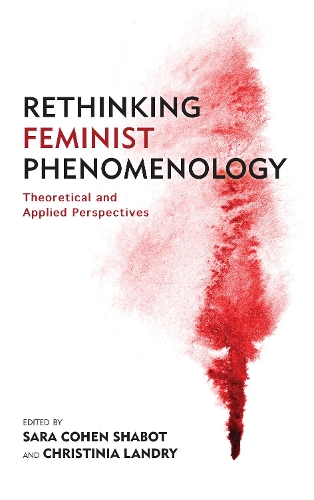
Rethinking Feminist Phenomenology: Theoretical and Applied Perspectives
(Hardback)
Publishing Details
Rethinking Feminist Phenomenology: Theoretical and Applied Perspectives
By (Author) Sara Cohen Shabot
Edited by Christinia Landry
Bloomsbury Publishing PLC
Rowman & Littlefield International
5th October 2018
United Kingdom
Classifications
Professional and Scholarly
Non Fiction
Gender studies, gender groups
142.7082
Physical Properties
Hardback
246
Width 157mm, Height 231mm, Spine 20mm
522g
Description
Although feminist phenomenology is traditionally rooted in philosophy, the issues with which it engages sit at the margins of philosophy and a number of other disciplines within the humanities and social sciences. This interdisciplinarity is emphasised in the present collection. Rethinking Feminist Phenomenology focuses on emerging trends in feminist phenomenology from a range of both established and new scholars. It covers foundational feminist issues in phenomenology, feminist phenomenological methods, and applied phenomenological work in politics, ethics, and on the body. The book is divided into three parts, starting with new methodological approaches to feminist phenomenology and moving on to address popular discourses in feminist phenomenology that explore ethical and political, embodied, and performative perspectives.
Reviews
In rethinking the normal these essays show how feminist phenomenology is not just still relevant, but is more critical than ever for understanding gendered relations. Addressing contemporary issues such as the #MeToo Movement, the existential damage of school shootings, and experiences of intersectionality, as well as key theoretical questions, the authors define the field. -- Helen Fielding, Associate Professor of Philosophy and Women's Studies, Western University Ontario
Shabot and Landrys collection moves our conception of feminist phenomenology forward in important ways. It takes us from the second sex to becoming-woman, from essentializing to possibilizing, intersubjectivity to intersectionality, the situated woman to the distressed body, oppression to generosity, injustice to moral impartiality, the autonomy of mental faculties to empathetic intimations, murderous flesh to care of and for the body, bounded to carnal intercorporeality, existential damage to feminist self-defense, singular to complex embodiment, and from anonymous individuals to collective spectatorship. These transitions mark the end of the normalized phenomenological subject and the arrival of a new phenomenology founded on gendered and multi-faceted cognition, mobility, sensation, and affective life. -- Dorothea E. Olkowski, Professor of Philosophy, University of Colorado
This collection not only confirms that feminist phenomenology is still relevant, but does more. The volume puts feminism and phenomenology to work in creative ways, confronting the reader with important unresolved issues uncovered by feminism and offering potential ways to address them by way of phenomenology. The sum is a crucial reflection for our challenging times. -- Christine Daigle, Professor of Philosophy, Brock University
Author Bio
Sara Cohen Shabot is an Assistant Professor in the Women's and Gender Studies Graduate Programme at the University of Haifa, Israel. Christinia Landry is an Adjunct Professor in Philosophy at Wilfrid Laurier University, Canada.
